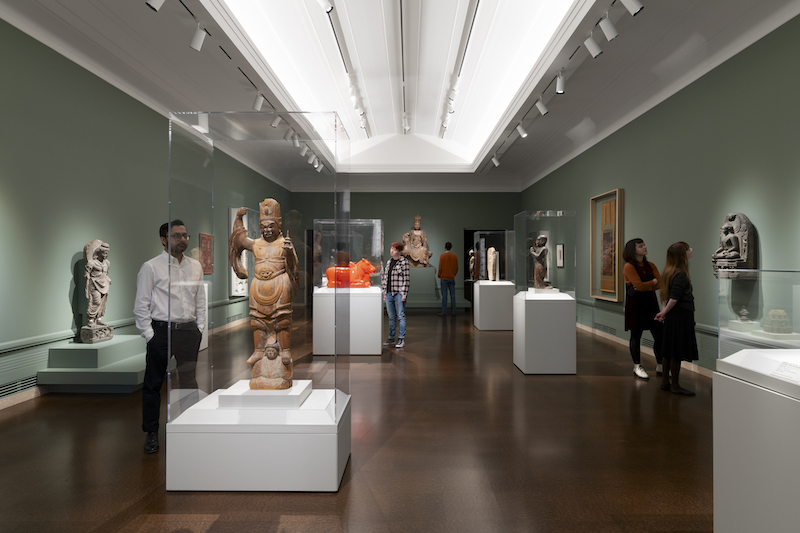Art Museums—Not Just For Your Grandma and Her Bingo Friends Anymore!
Review of SAM's Asian Art Museum
Written by TeenTix Newsroom Writer Valentine Wulf and edited by Teen Editor Anya Shukla

I am not a museum person. Surprisingly, however, I wasn’t begging for death by the time I reached the gift shop of the newly renovated and expanded Asian Art Museum in Volunteer Park. In fact, I enjoyed every minute of the experience.
The Asian Art Museum feels welcoming from the minute you step in the door. The redone space lacks the usual cold, sterile, hospital-esque feel of your run of the mill museum and is definitely a building you want to spend time in.
I was already thoroughly impressed at Will Call when the museum staff behind the desk handled some confusion with tickets in an outstandingly professional manner. As I made my way through the various exhibits (whose walls are painted in comforting shades of muted blues and greens), anytime I had a question (whether it be about the content of an exhibit or simply how to get to the bathroom), an employee had an answer. Questions were few and far between, however, as the museum’s organization is outstandingly well executed.
The Asian Art Museum doesn’t segregate art by country of origin and time period as many traditional museums do. Instead, exhibits are set up and organized by content. The “Bringing Blessings” room, for example, consists of artwork from a myriad of Asian countries and spanning thousands of years. From fertility statues to carvings created to bring a plentiful harvest, each piece was created with the intent of bringing some sort of success or blessing. Another room, called “Sacred Texts,” contains scrolls and ancient holy books, like a section of Japan’s “Lotus Sutra” or a page of the blue Quran. A room of ritual objects incorporated both ancient carvings as well as a bright red fiberglass sculpture made by Indian Artist Arunkumar H.G. in 2008.
Organizing objects by the artist’s intention behind them rather than by time and place beautifully illustrates cultural differences and similarities across Asian cultures, allowing for an interesting and refreshing look at the diversity of Asian artwork. Each country and culture has items similar in concept and purpose yet has its own very unique aesthetic and interpretation.

While all of the Asian Art Museum’s art history exhibits are spectacular, one of the most fascinating exhibits in the museum is the contemporary art section. In this large, airy room, works from modern-day Asian artists fill the space; many of these pieces examine Asian culture through a more critical eye. A series of photographs by Zhang Huan depicts a person’s face becoming more and more covered with Chinese characters (these characters, according to the artist statement, predict the future based on one’s facial features) until their skin is completely unrecognizable, perhaps alluding to the idea of tradition masking the individual. A piece by Ai Weiwei consists of ancient vases covered in brightly colored industrial paint to illustrate that what is underneath—like history itself—is no longer visible, but still present.
Perhaps the most show-stopping contemporary piece of all is the enormous metal sculpture of a piece of Asian armor in the center of the room, whose “fabric” pools on the floor in a massive circle. The coat, upon closer inspection, is made up of hundreds of stainless steel military dog tags. The artist statement explains that the artist, Do Ho Suh, who served two mandatory years in the Korean military, used many small pieces to create one singular unit to illustrate the relationship between an individual and a society.
The new Asian Art Museum combines ancient artifacts with all manner of contemporary art and somehow manages to do it all in an incredibly welcoming, beautiful space. This is a must-visit for any lover of art or history—and the flawless execution will fill the void in the soul of any interior design enthusiast. While art museums are indeed popular with snobby old people, the Asian Art Museum’s inclusion of both ancient and modern pieces makes it a one-of-a-kind experience for all ages.
SAM's Asian Art Museum reopened on February 8, 2020. See hours and information here.
Lead photo credit: Belonging exhibit at the Asian Art Museum. Photo by Jueqian Fang.
The TeenTix Newsroom is a group of teen writers led by the Teen Editorial Staff. For each review, Newsroom writers work individually with a teen editor to polish their writing for publication. The Teen Editorial Staff is made up of 6 teens who curate the review portion of the TeenTix blog. More information about the Teen Editorial Staff can be found HERE.
The TeenTix Press Corps promotes critical thinking, communication, and information literacy through criticism and journalism practice for teens. For more information about the Press Corps program see HERE.

